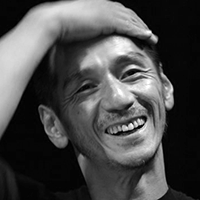In early 1980s, after being initiated into the world of performing arts at a student’s Spanish theater group in Tokyo, Takao Kawaguchi joined le Théâtre de la Mandragore Tokyo, mime-based physical theatre company in 1985. With a whiff of post-Hijikata butoh, Kawaguchi also had glimpses of performance art, post-modern and contemporary dance before going to pre-Olympic Barcelona where he was washed in the new waves of European theater and dance. Upon return home in 1990, he self-taught and formed a small company called ATA Dance before joining Dumb Type in 1996-2008.
The turn of the millennium, however, inspired him to go solo, playing with modern-punk musicians/artists, wizards of light and sound, including Atsuhiro Itoh (Diquenoves (Say You Don’t See) (2003 & 2006); Fuyuki Yamakawa (D.D.D. -- How may more times will my heart beat before it stops?) (2004-07); and Daito Manabe (TABLEMIND) (2006 & 2011). Since 2008, Kawaguchi has been working on his biographical solo, a site-specific docudrama performance series called a perfect life until today. The most recent one, the 6th of the series, From Okinawa to Tokyo, was presented in February 2013 at the Ebisu Moving Image Festival at the Tokyo Metropolitan Photography Museum.
Lately, despite having missed Tatsumi Hijikata and Kazuo Ohno alive, Kawaguchi has looked into the archives to work on The Ailing Dance Mistress – two solos inspired by the texts of Tatsumi Hijikata (2012) – and About Kazuo Ohno – Reliving the Butoh Diva’s Masterpieces (2013). Kawaguchi has been touring the latter show around Asia and Europe in the past year. Away from Butoh, his latest creation Touch of the Other, a performance based on the sociological research on male-to-male sex in public toilets in the 60s by US sociologist Laud Humphreys, was presented at ONE National Gay and Lesbian Archives and REDCAT Theater in Los Angeles before being premiered in January 2016 in Tokyo.
Kawaguchi has participated in a number of collaboration projects including: true (2007) and Node – The Old Man of the Desert (2013) with Takayuki Fujimoto and Tsuyoshi Shirai; and Tri-K (2010) with Dick Wong (Hong Kong) and Koichi Imaizumi, and Naoto Iina’s Neppu (The Hot Wind) (2014).
Besides, Kawaguchi was the director of Tokyo International Lesbian and Gay Film Festival from 1996 to 1999. He translated Derek Jarman’s Chroma into Japanese in 2002.
Takao Kawaguchi currently lives and works in Tokyo.
Last Updated: 2017
